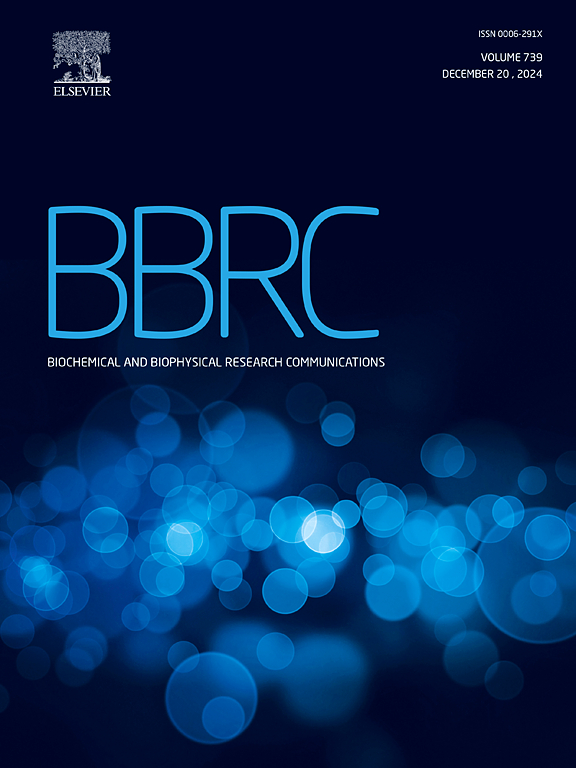在AOM/DSS小鼠模型中,纳米聚合东莨菪碱通过调节细胞因子和炎症介质抑制结直肠癌进展
IF 2.5
3区 生物学
Q3 BIOCHEMISTRY & MOLECULAR BIOLOGY
Biochemical and biophysical research communications
Pub Date : 2025-05-08
DOI:10.1016/j.bbrc.2025.151973
引用次数: 0
摘要
东莨菪素(6-甲氧基-7-羟基香豆素)属于香豆素家族,具有许多药理作用。本研究探讨了纳米胶囊聚合东莨菪碱(NEP-Sc)在小鼠结肠癌模型中的作用。雄性Balb/c小鼠在结肠癌诱导后连续10天补充NEP-Sc(2.5和5 mg/kg b.w)和5-氟尿嘧啶(25 mg/kg b.w)。用宏观检查评估结肠息肉和形态,其评分建立NEP-Sc的改善效果。同时测量体重、腹泻评分和脾脏重量。测定大鼠黏膜中谷胱甘肽(GSH)、超氧化物歧化酶(SOD)、丙二醛(LPO)和一氧化氮(NO)的抗氧化状态。免疫组化分析β-catenin和Ki-67水平,评价炎症反应。采用elisa法检测IL-4、IL-6、IL-10、tnf - α、ifn - γ和VEGF水平。在经NEP-Sc处理的小鼠AOM/ dss引发的结肠癌中,上述所有参数均得到缓解。纳米胶囊聚合东莨菪碱对AOM/ dss诱导的小鼠结肠癌具有保护作用。综上所述,我们的研究结果表明,NEP-Sc可能作为一种有希望的治疗结肠癌的候选药物。本文章由计算机程序翻译,如有差异,请以英文原文为准。
Nano encapsulated polymeric Scopoletin suppresses the progression of colorectal cancer by regulating cytokines and inflammatory mediators in AOM/DSS murine model
Scopoletin (6-methoxy-7-hydroxycoumarin) belongs to the family of coumarins with numerous pharmacological benefits. The present study deals with examining the efficacy of Nanoencapsulated polymeric Scopoletin (NEP-Sc) in murine colon cancer model. Male Balb/c mice were supplemented with NEP-Sc (2.5 and 5 mg/kg b.w.) and 5-fluorouracil (25 mg/kg b.w.) for 10 days consecutively post-induction of colon cancer. Colon polyps and morphology were assessed using a macroscopical inspection, and their score establishes the ameliorative effect of NEP-Sc. Body weight, diarrhoea score, and spleen weight were also measured. The antioxidant status of the mucosal levels of glutathione (GSH), superoxide dismutase (SOD), malondialdehyde (LPO) and nitric oxide (NO) were evaluated. The β-catenin and Ki-67 levels were analyzed through immunohistochemistry analysis to assess the inflammatory response. ELISA-based analysis was used to measure IL-4, IL-6, IL-10, TNF-alpha, IFN-gamma, and VEGF levels. All the aforementioned parameters were mitigated in AOM/DSS-triggered colon cancer in mice treated with NEP-Sc. Nanoencapsulated polymeric Scopoletin offered protection against AOM/DSS-induced colon cancer in mice. To sum up, our research findings suggest that NEP-Sc may act as a promising candidate for treating colon-associated cancer.
求助全文
通过发布文献求助,成功后即可免费获取论文全文。
去求助
来源期刊
CiteScore
6.10
自引率
0.00%
发文量
1400
审稿时长
14 days
期刊介绍:
Biochemical and Biophysical Research Communications is the premier international journal devoted to the very rapid dissemination of timely and significant experimental results in diverse fields of biological research. The development of the "Breakthroughs and Views" section brings the minireview format to the journal, and issues often contain collections of special interest manuscripts. BBRC is published weekly (52 issues/year).Research Areas now include: Biochemistry; biophysics; cell biology; developmental biology; immunology
; molecular biology; neurobiology; plant biology and proteomics

 求助内容:
求助内容: 应助结果提醒方式:
应助结果提醒方式:


